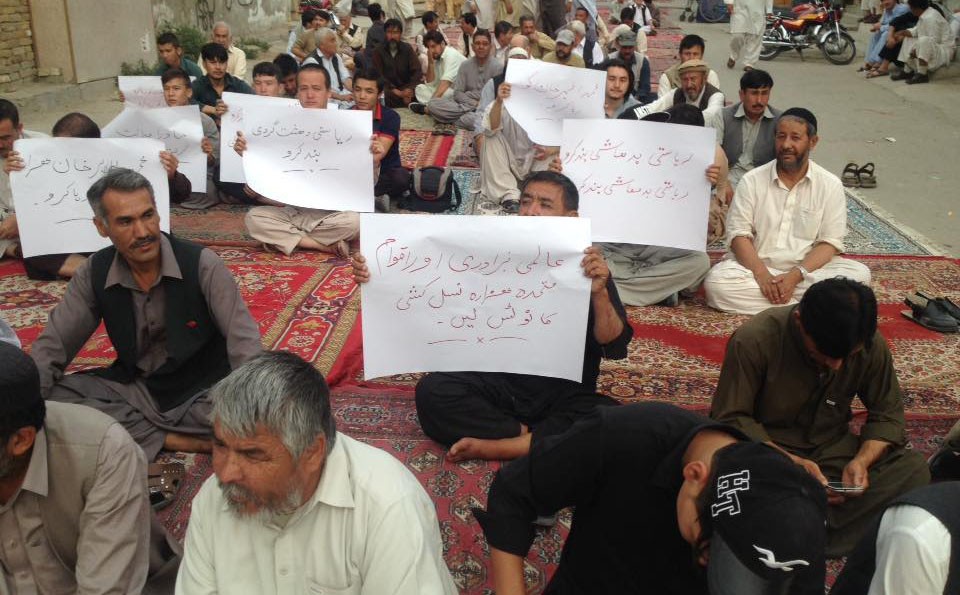
How the persecuted community thinks and feels

I met Tahir Khan many years back at an art academy, back in the days when I was preparing for university admission tests. He was a tan skinned man, wearing a waistcoat on his Shalwar Kameez, Peshawari Chappal on his feet and a Balochi Topi on his head; all covered with black coal dust. From the hair shavings on his collar, one could tell that he had paid a visit to a barber to trim his beard on his way to us. No one expected this humble coal merchant to inspire students with any wisdom, but then, he started speaking. He talked about arts, literature, culture and politics. He was one of the most eloquent people I had ever met. He had the presence and charisma of a brilliant politician, and his words always made good sense.
He was a rationalist who questioned our age-old prejudices. Pointing to a painting of bricks, he said "These bricks will do more service to the people than what these nationalists and religious fanatics will ever do." What he said kept resonating in my mind, and further strengthened my resolve to pursue a career in Arts. He took his leave with a contribution to the academy fund, and a promise for further support.
On May 29, 2015, a Karachi-bound bus boarded by Pashtun commuters from Pishin, was stopped in Mastung by militants, who killed 20 people in cold blood. Following the incident, Pashtun leader Mahmood Khan Achakzai was quoted in many newspapers as saying, "The Baloch shouldn’t compel us to announce a separate province".
Earlier this week, five Hazara men were gunned down at the bustling Bacha Khan Chowk in Quetta in broad daylight. The Frontier Corps, a paramilitary force operating under the Pakistan Army, has its personnel regularly patrol the area, and has numerous posts on location. There is a major police station within a hundred yard radius of the crime scene. In a video shared on social media, an eye witness claims that security personnel present on site turned a blind eye to the killers as they committed their heinous act and sauntered away.
Shia-Hazara community members gathered at the Shuhada Chowk to protest these killings. The crossing is named Shuhada Chowk (Martyrs Crossing) in dedication to the memory of the 100 people who lost their lives at the site in twin bomb blasts a couple of years ago.
Tahir Khan, while addressing the sit-in, criticised the role of the security establishment and the way it is tackling the Balochistan issue. He alleged that the security establishment targets the Hazara community with its proxies; organisations such as the Lashkar-e-Jhangvi, as a counter-insurgency tactic to divert the world’s attention away from the war of independence being fought by the Baloch.
He questioned the security establishment as to why it has continuously failed to protect its citizens, preferring instead the easy way out, by blaming foreign agencies. He said the people’s hard-earned money is taken as taxes in return for a good life, but instead, they continue to live in terror.
He asked the United Nations to come forward in aid of the Hazaras, as the Hazara people have been rendered powerless and cannot defend themselves from the ongoing violence.
A day after his speech, Tahir Khan’s son Athar Khan was extrajudicially abducted from Spin Kaarez. Spin Kaarez is an area on the outskirts of Quetta, from where Tahir and Athar Khan had run their coal business.
While on the one hand people are abducted for mere speeches, murderers roam around the city, freely spraying bullets on citizens with not one of them being apprehended for their crimes.
The Ahl-e-Sunnat Wal Jamaat and their militant wing Lashkar-e-Jhangvi take out public rallies in the Quetta’s central bazaar, displaying their weapons and chanting anti-shia slogans. They upload videos on social media showing speeches of their leaders at these rallies. One can surf the internet and easily find for themselves ASWJ leaders’ speeches mongering hate against the oppressed Shia-Hazara community.
A few days back, I watched a video in which an ASWJ leader by the name of ‘Commander’ Abdul Kabeer Shakir, openly threatens the Balochistan government and calls the Hazara community leaders dogs, while standing on a traffic police pedestal at Qandahari Bazar. The Qandahari Bazar, a financial hub, is remarkable for its location, smack in the middle of Quetta, with government institutions such as the Governor’s House, Balochistan Assembly, and the Balochistan High Court within walking distance. At such a public venue, Commander Shakir tries to convince the public that the Shia are their enemy, and asks the government to limit the Shia presence in their area, otherwise he would take the task himself.
Our friends and well-wishers beg us to leave the city for our own safety. The torture we’ve been going through as a community makes us afraid of friend and foe alike.